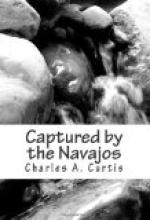“What sound is that, Mr. Duncan?” he whispered.
I listened intently, and presently heard the distant bleating of sheep, and soon after the deeper low of an ox.
“The Indians must be approaching,” I replied. “You may stir up the men. Be careful that no noise is made.”
I continued to listen, and after a long time noticed a sound like the rushing of wind in a pine forest. It was the myriad feet of the coming flocks and herds, hurrying along the grassy valley. The men began to assemble about me, all preserving perfect silence, listening for the approaching Indians.
Another half-hour passed, and over a roll in the surface of the valley, revealed against the sky, looking many times their actual size in the uncertain perspective, appeared two tall figures, whose nearer approach showed to be mounted Indians piloting the captured stock, which followed close behind.
“Corporal Henry,” I said, “drop carefully down into the trail and skirt closely along the wall until you come to Sergeant Cunningham’s position, and tell him the Indians are close by. Tell him also to allow the two Indians in advance to pass unmolested.”
I sent this order by the younger boy because I suspected he was feeling that Corporal Frank’s expedition to Jemez, with the adventures of the return trip, had given him a certain prominence to be envied. I meant Henry should divide honors with his brother hereafter.
The little corporal silently disappeared beneath the wall, and a few minutes afterwards the two Indians entered the defile, and the goats and sheep, which had been spread widely over the open valley, scampered, crowded, and overleaped one another as they closed into the narrow way. There seemed to be fully two thousand of them, intermingled with a motley herd of horses, mules, asses, and kine of all sizes and descriptions, numbering three hundred or more, all driven by a party of seventy-three Indians.
The cattle-thieves were evidently congratulating themselves upon having run the gantlet of the military camp and being out of danger, for they had abandoned the traditional reserve of the Indian race, and were talking loudly and hilariously as they passed my wing of the ambuscade. The Indians fell completely into the trap, and they and the cattle with them were captured without any difficulty.
During the winter our supply of grain ran short, and I sent a party, with the Cordovas as guides, to Jemez. They were unable to get through the snow, and the elder Cordova was so badly frost-bitten that in spite of all we could do he died in the camp.
Then I went with a larger party, and was successful. On June 1st orders came to break up the camp, and on the 9th the accumulated stores of nineteen months’ occupation were packed, and with a train of ten wagons we set out for Santa Fe.
VI
CROSSING THE RIVER




